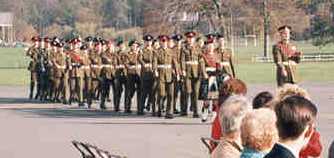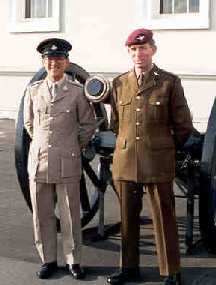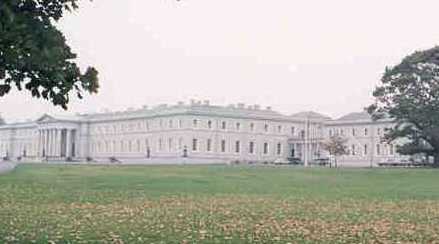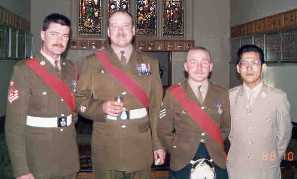Tears and Sweats
The TA Commissioning Course started with a 3-mile run around the Old College. I soon discovered how fit the other officer cadets were. The leaders were the two Para's - OCdts Eddie MARSHALL and Tony RUSSELL-WARD. I did it for 18 minutes and this was already my best time.
The purpose of command tasks was to give the officer cadets a chance to organise and accomplish a given task and in so doing demonstrate their leadership. I was asked to deliver a log which weighed about 250 lb across an obstacle - an iron scaldfolding about 12 feet in height. This was a relatively simple task. By fixing ropes to the two ends of the log, we were able to lift it up to the 4 lads waiting on top of the scaldfolding. The 4 strong guys then rolled the log to the other end and lowered it to the ground where we were waiting. The visiting Company Commander gave an approving smile as the task was completed. I thanked my freinds for their help. Team spirit was apparanetly a key to success.
Field exerciseswere held in the Salisbury Plain . To a man from a small place such as Hong Kong, the plain was huge and open. Looking around, all the four directions seemed to end up nowhere. Occasionally, a chopper flew by lifting underneath it either a 105 mm gun or an armoured car. There were no hills and isolated bushes were here and there. The land was very different from ours in Hong Kong.
Upon arrival to the exercise area, we were given a demo by the Gurkha demo platoon. Their performance was to the textbook standard. Six years after the Falklands, the infantrymen's attack on enemy position took the form of fire and manoeuvre. Like frogs, each small group making up of 4 riflemen, the attacking sections moved on to the enemy trenches from the startline like programmed robots. It was a fascinating sight......4 up......4 down.....4 up......4 down.....The enemy trench was overun. At this juncture, an injuried enemy soldier ran out of the trench, struggled and threw himself to an onlooker, discharging to the poor man a mouthful of blood before he finally died. It was great fun and all of us enjoy the show. The demo platoon was greeted with a warm applause from all of us.
It was then our turn. On such a wide open ground, troops could practice virtually all formations - diamond, arrow head, single file, extended line.... Unlike in Hong Kong, field tactics here was dictated by the platoon commander at will. In the field, we were given different assignments - platoon commander, sergeant, NCO, scout or runner in turns. Everyone worked hard.
Captain BANHAM showed a particular interest in our "O" Groups. He dropped notes from time to time. Working closely with the CSgt KEITH, he was assessing us all the time. We were aware that some of us might fail the course.
I was assgined to lead a 5-man recce patrol to a given grid. I did a map appreciation on the not too familiar 1:50,000 map. It was by the side of a bush. I selected the 4 men and assgined their roles. I then had a look at the map again and decided on the route in and route out and worked out length of the 3 sticks. Conciously I avoided all footpaths and open ground where the patrol would be vulnerable and insisted on walking through the bushes according to pacing and bearing. While I would be the one who checked the compass, I left the pacing to an officer cadet who claimed himself to be a "pacing expert". The O Group took place at 2100. After some preparation and rehearsals, we moved out at 2145.
It was a cold and wet night. Even with the woollen pullover, I could not help shivering. I could hardly imagine how my friends held their exercise in winter with frost on their sleep bags. The weather in UK was too cold for me. I missed Hong Kong's October.
The recce reached the place after 40 minutes' walk. Not far away, a fire was spotted. I ordered an all-rounded defense with our legs inter-knocked. I moved forward with another man to have a better look at the position with the aid of IWS. It was a man with a rifle resting by the side of fire. I observed for a while, trying to ensure that the man had no no other men with him. Silently we crawled back to rejoin the main party. The finding was immediately passed on to everyone in the recce just in case two of us got killed on the way back. (Well, textbook stuff!) It was a smooth operation, except that as we moved back we almost went into the an enemy patrol. The next morning, the Colour Sergeant praised us for 3 things - good preparation, simple orders and strict field discipline. Right, simple and feasible orders were another key to success. As an officer later on, I always bore this in mind.
Most of the officer cadets came from the University Officer Training Corps (UOTC). Aged 22 or 23, they were in the fittest shape of their entire life. Hence, whenever it came to matters involving speed and physical exertion, I was always left behind. Running cross-country with weapon and kits on was no fun. On a few occasions, I thought I was about to die. My lungs could burst at any time.
After a few days in the field with little sleep. All of us were so tired that we could fall asleep while walking.
Finally came the ending exercise which put us under a frontal attack of the gurkhas. They were all dressed up in different military uniform to stand themselves out from us. At first light, my partner and I were waiting eagerly in our trench which we had dug for 8 hours. By then, I had learned how to remove the turf from the surface and put them decently in front of the trench. When we order to prepare meal for ourselves, I prepared for myself and my partner, a tall bloke from New Castle, hot instant noodle. "It tasted good ! Cheung. Send me some of these noodle when you return home", he said. Our trench looked funny. It did not have a flat bottom. There was a slope leading from one side to another, resulting from difference of height.
At 0800, the attack started. Once again, the gurkhas were hopping like frogs. Everything was so real and I got the feeling that we were in real war situation. The enemy started the fire and manouvers about 150 meters from us. As they moved closer, the gurkhas became easy targets for us. I could imagine that before they actually reached us, more or less two-third of them would have been wiped out. That was why the golden rule always advocated 3 against 1 for the attacking side.
The exercise came to an end at the heat of the attack when the gurkhas reached our trenches. We were brought back to the Old College which welcomed us with hot meals and cleans blankets. I locked myself in the bathroom and drowned deep in a tug of hot water. My back was aching badly. It was the best bath in my life.
Then came a breath-taking moment. Captain BANHAM was to announce who could stay and who should leave. It was a not too pleasant moment. Three of us, one from Burmuda and two from UK, had to leave Sandhurst immediately. The rest of us, inclduing myself, were to prepare for the passing-out parade 2 days later. |




